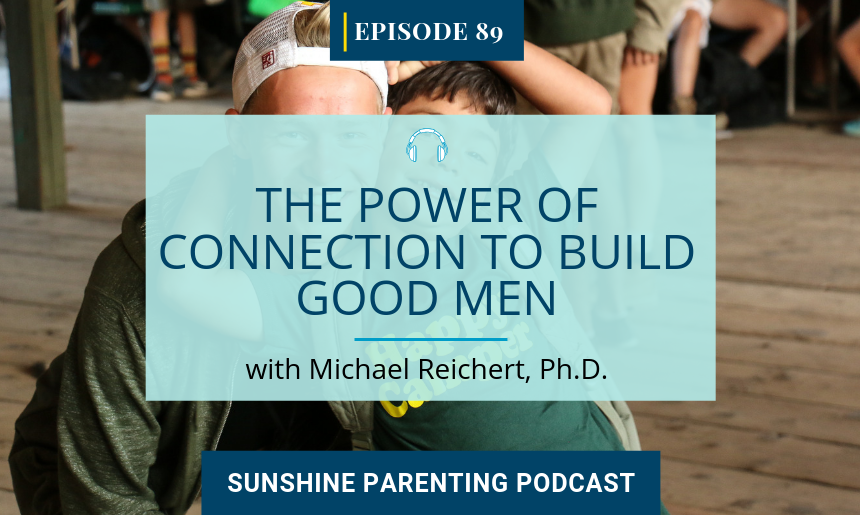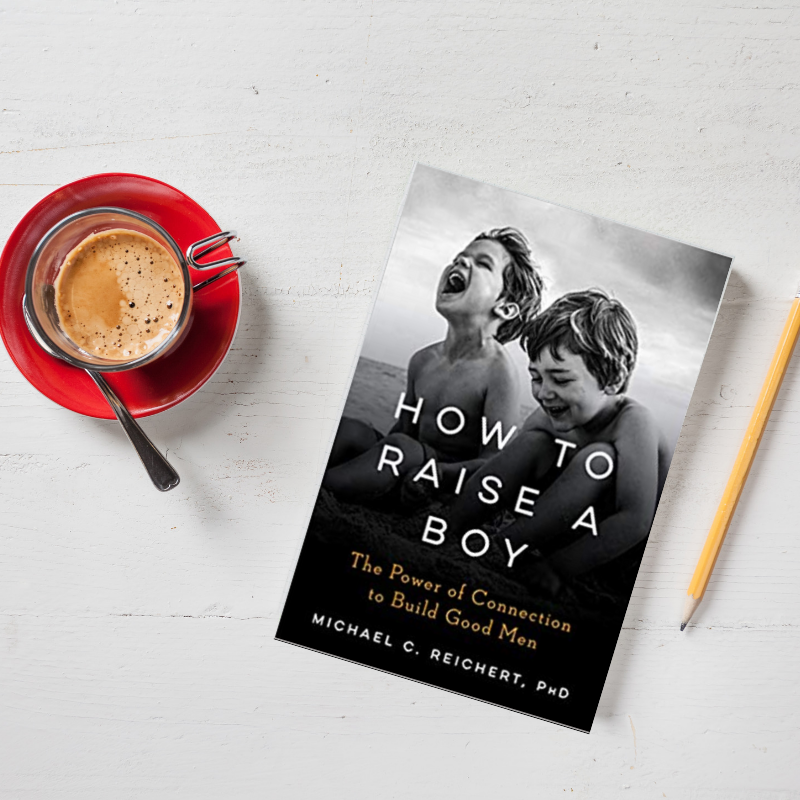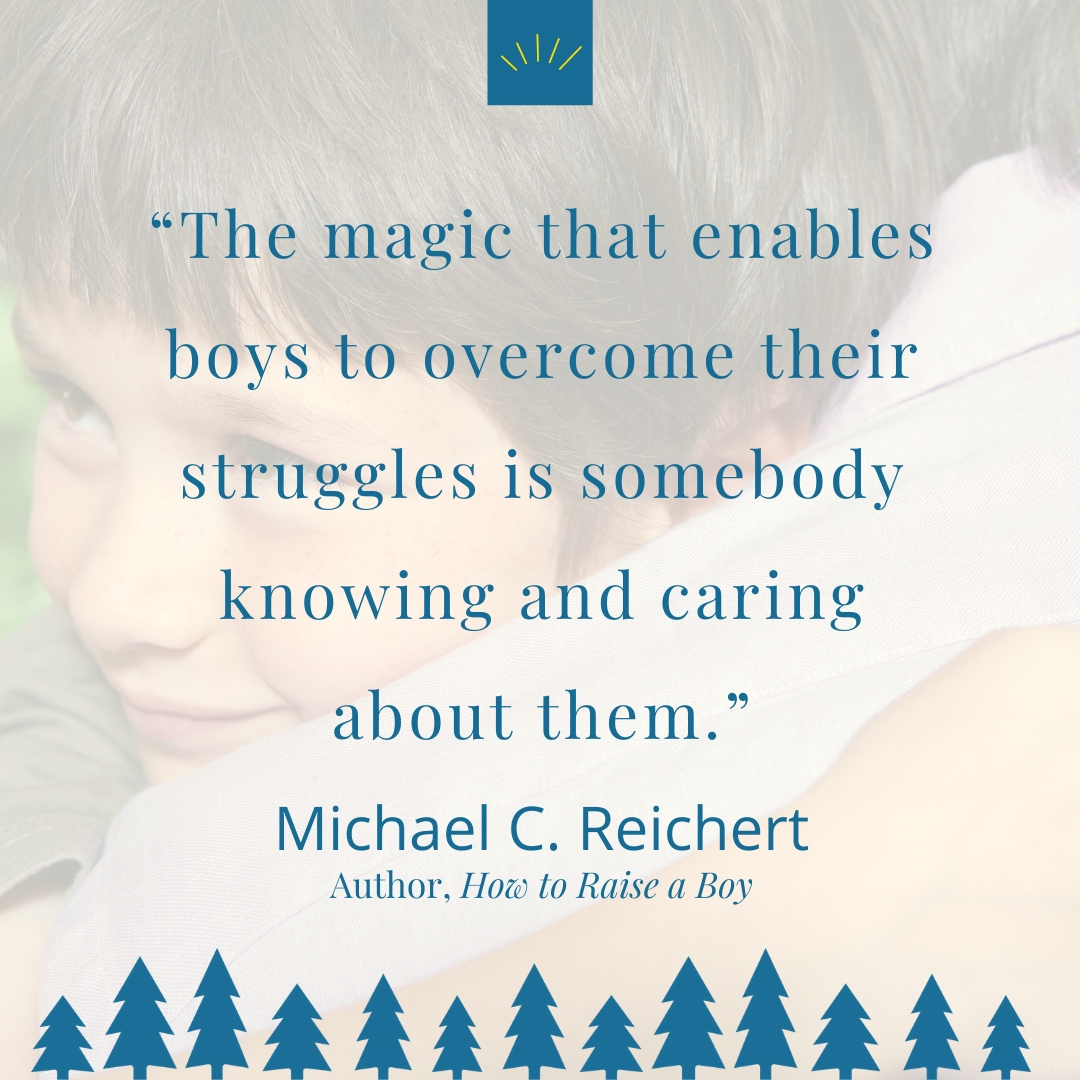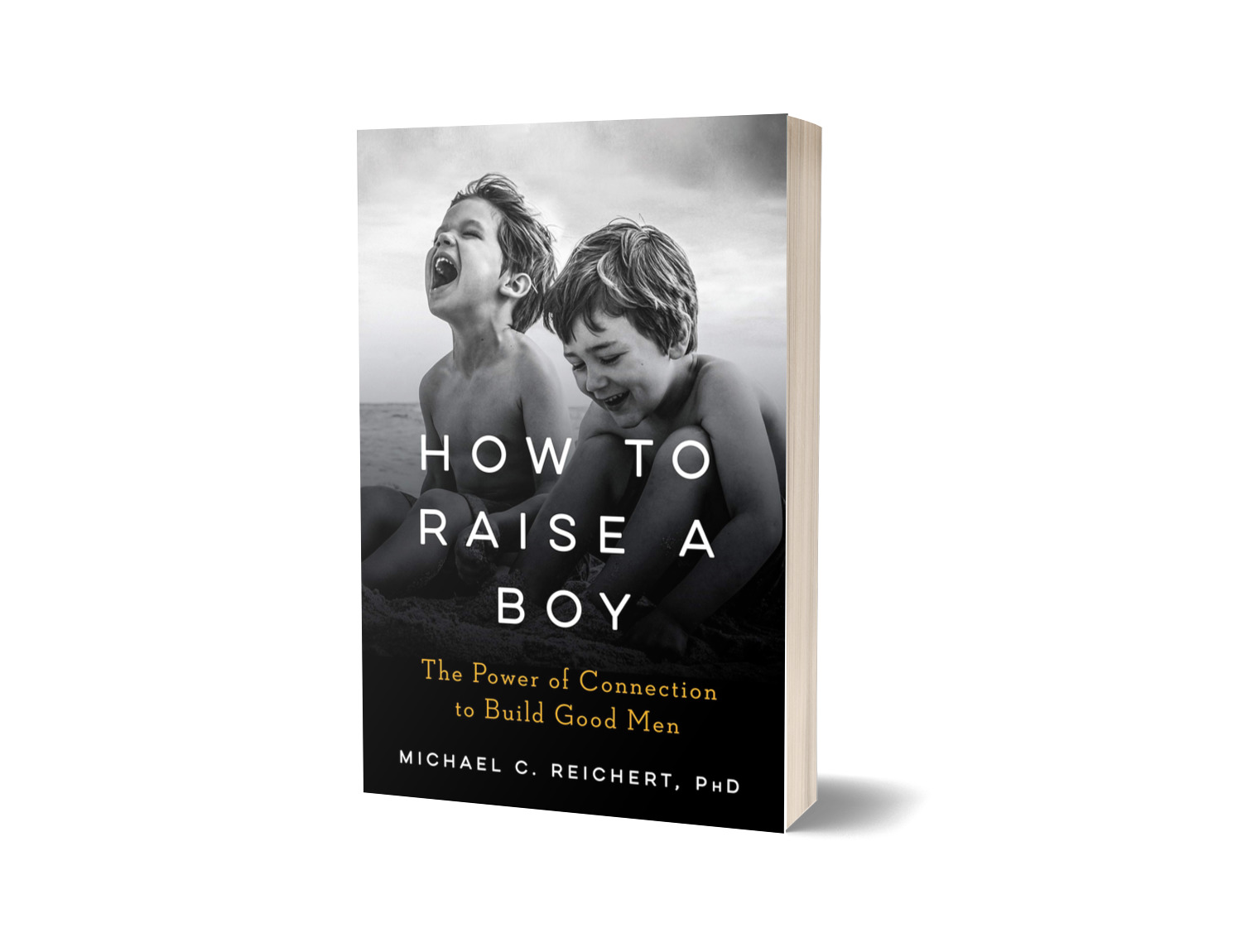
“Give yourself the gift of listening to a boy and don’t be put off by boys that seem like they don’t want your gift, they can’t help themselves. They will want it sooner or later.”
Michael Reichert, Ph.D.
In this podcast episode, I interview Michael C. Reichert, Ph.D., founding director of the Center for the Study of Boys’ and Girls’ Lives and executive director of School Participatory Action Research Collaborative at the University of Pennsylvania. His new book, How to Raise a Boy: The Power of Connection to Build Good Men, draws on his decades of research to challenge age-old conventions about how boys become men.


BIG IDEAS
- Make sure your boys feel known and loved.
- Understand that all boys need connection.
- Just because boys tend to get quieter in adolescence, it doesn’t mean that there isn’t a lot going on with them emotionally.
- Sometimes parents, teachers and other adults try to control or dominate boys rather than connect with them. Those strategies don’t bring out the best in boys. We might secure their conformity but what we really want to do is cultivate their virtue and skills.
- We can build and maintain strong relationships with boys by:
- Deep listening
- Special time
- The listen-limit-listen model of discipline
- Parents need to be their child’s relationship manager.
- It is more constructive to discipline and set limits in a calm atmosphere so that boys understand that the limits are intended to help them and not dominate them.
QUOTES
AUDREY: “Summer camp has a lot to teach the rest of the world because at camp we are focused 100% on the relationship, connection, and fun. And we’re not concerned with grades or scores and that helps kids a lot because to be in a setting where it’s just about them—being able to think and be themselves—is quite powerful.”
MICHAEL: “I think schools everywhere are talking about boys, wondering about boys. We’re realizing that our guiding theories don’t work very well. We need something that’s more rigorous, more developmentally grounded, and consequently, a very different approach to boys. And that’s really what I tried to outline in my book. I tried to talk about the new science that’s emerging from the field of boyhood studies, which is not longer than 20 or so years old.”
MICHAEL: “Outdoor experiences and experiential education opportunities allow us to get to know boys outside of the conventional ways that we measure and evaluate them. We tend to know them as performances rather than people. Training your counselors to understand the power they have to build those kinds of relationships that can alter a boy’s trajectory is really important work.”
AUDREY: “There’s a lot of research right now in the camp world and they’re finding that the biggest, most positive outcome former campers are reporting is the relational skills they learned at camp. They’re saying that it was unique to that experience. It was a place that, far more than any other setting, helped them with their relationships, which is amazing to think about. That is why we really need to get more kids to camp!”

MICHAEL: “In our studies we found that the only way a boy will do something that he doesn’t know how to do, or do well, to go to that vulnerable edge and risk that uncertainty, is if there’s an existing relationship, some degree to which he feels like he can trust the adult to be a guide and to know him as a person. So I’m sure at camp you find that with the boys who are misbehaving or struggling, the magic that enables them to overcome those struggles is somebody knowing and caring about them.”
AUDREY: “We all just have this desire to be seen and known for who we are. And when we don’t look deep enough into our boys, they’re going to be known for something. And sometimes it becomes bad things when they’re not getting the attention they need from a caring adult.”
MICHAEL: “At birth, boys are just as emotionally capable as girls. It’s not the experience of emotions that differs by gender. It’s the expression of emotions and the opportunities that we provide children to practice coding feelings with language and communicating it. And we shut those opportunities down for boys early, early, early.”
MICHAEL: “On top of that, we have asked boys to put on a mask, to adopt the masculine persona that enables them to avoid being bullied or mistreated, somehow policed by their peer group, and behind that mask, boys are often misperceived.”
MICHAEL: “There has never been a better time in human history to be caring for a boy. We are actually in a position to examine the nature of the boyhood that we construct and manage for boys. We have to dig deeper to look at the science of human development behind what we know about boys. It’s very clear that we are wired to connect. Our human brains, our human hearts develop in relationships. We have to offer boys and girls, all children, the kinds of opportunities, the kinds of relational opportunities that let themselves feel known and cared about. That’s square one. It’s revolutionary when we apply it to boys because there’s still these overarching stereotypes and confusions that come into play for all of us.”

MICHAEL: “Deep listening is the gift of paying attention to someone, directing our mind and heart to that person, settling our own thoughts, reactions, and associations with what they’re saying, and giving them the space where they can tell us what they’re thinking, what’s going on with them, without interruption, without having to worry about being judged, without having to be given advice or directed in some way.”
MICHAEL: “It’s a muscle that we don’t develop or practice very much, but simply paying attention and listening—without intervening. Sometimes parents feel like they have to give guidance or counselors feel like they have to set parameters. But what we can expect from deep listening is that it helps the boy to become more consciously aware of his behavior, where it might be going off-course and he can self-correct. That’s the long game I’m talking about; we want boys to self-correct. We want boys to be self-monitoring and self-regulating. So listening is the most basic skill for supporting that.”
AUDREY: “You just have to be very patient. I remember so many times picking my boys up from school and they just need a snack and don’t really want to talk. And then occasionally, one would just spill out some story, want to talk or share an idea. We would end up having these really good, deeper conversations. But you just have to be there and be ready for it, just waiting.”
MICHAEL: “Create a space that a boy can depend upon, where he knows he will find you hanging in with him no matter where he goes or what interests he has. We assign a set time, 15 minutes, a half an hour, or an hour and say to ourselves, ‘I’m going to go be with my son or this camper, and I’m simply going to accompany him. I’m not going to direct that time. I’m not going to structure it. I’m not even going to make suggestions for what he should do. I’m going to sit down and I’m going to do what he’s doing and I’m going to be interested in what he wants to do with our time together.’ At first, it might be playing video games or throwing pebbles in a stream or shutting down and doing nothing. But indicate to the boy that you’re going to stay with him, and that what interests you is whatever interests him, even if it’s uncomfortable.”
MICHAEL: “Hang in there and continue to pay attention. You’ve got developmental power on your side; He needs what you’re offering. Stay with him and don’t be thrown off if he seems to not be noticing that you’re paying attention to him. Continue doing it and, in time, he will turn toward you like a plant to the light.”
MICHAEL: “What we often don’t perceive is the world that your son inhabits and how vigorously it prevents him from opening up and being vulnerable.”
AUDREY: “We call it ‘one-on-one time’ at camp where counselors check in with each camper just to ask, ‘What’s going on? How’s your day going so far? What can I help you with? How are your friendships?’ It’s part of the counselor’s job description to have that eyeball to eyeball and be fully attentive to each kid at some point during the day. Sometimes as parents we are so caught up in the day that we forget to just ask how their day is going.”
MICHAEL: “There is no greater gift that a caregiver can give to a boy than that (special, one-on-one time). I have high school age boys telling me that no one’s paying attention to them anymore except in terms of what they do. And they’re being heavily paid attention to in terms of their marks on tests or their athletic prowess or how cool they are. But to actually have somebody tuning in and being with them, paying attention to them, that is a rare and incredibly powerful gift.”
MICHAEL: “Every time we’re correcting a boy or providing discipline to him, what we’re really trying to do is build his capacity for self-regulation. We’re playing a long game and we’re trying to cultivate his own steering mechanism.”
MICHAEL: “So much of boyhood is about submitting to dominance, whether it’s peer group pecking order or all the different activities that boys get involved in. I think in camp or in other contexts, we actually have the opportunity to take a longer read of the situation.”
MICHAEL: “So it’s ‘listen, limit, listen’. The real payoff is that third step for the boy because you’ve checked him and probably what’s driving him off-course is emotional energy of one kind or another that he’s not aware of. Out will come that emotional energy that he’s unaware of, whether it’s resentment or disappointment or rivalry or fear or sadness about something else. Your job is simply to be what we call a holding environment, a container for that, and not to tell him what to think or to correct him, but simply to let him get it off his chest and get it out in the open in the light of day.”
AUDREY: “I think it’s difficult for parents to separate their own dreams, expectations, and emotions from what their boys are doing. I really like when you talk in the book about this whole thing about how we, the adults need to be the repairer of ruptures in our relationships.”
MICHAEL: “If the boys seem shut-down or uninviting to the teacher or the caregiver, that should be a message to the caregiver that, as the relationship manager, it’s their singular responsibility to try a different strategy to reach that boy. Often what we find is that boys come to a relationship with adults already disappointed and perhaps even broken because of the boyhood that they’ve experienced and they’re not so easy to connect with. They might be really stone-faced or uninviting altogether or outright oppositional, even disruptive. It’s the relationship manager’s responsibility to not take those things personally, to recognize that they have this transformative power and to continue to try different strategies.”
MICHAEL: “If you reach the end of your rope and you have nothing more in your bag of tricks, that doesn’t mean that that boy is unreachable. This was the key insight from our study because what we saw was every type of boy with every type of problem was, in fact, being reached by someone with some particular approach. What it means is if you’ve exhausted your relational repertoire, you need to actually go back to square one and reimagine how to, how to try a different approach to that boy and expand your repertoire, not give up on the boy or conclude that somehow he’s unreachable.”
AUDREY: “Kids just need one person, whether it’s a parent or a mentor, one caring adult can make the difference in the whole trajectory of their life.”
MICHAEL: “The news in these studies that we did was the transformative power of connections with camp leaders or educators or coaches. Every boy can tell a story of being uplifted by some adult that actually patiently reached him and helped him see himself in that more positive way.”
RESOURCES
How To Raise A Boy: The Power of Connection to Build Good Men
Michael Gurian’s book, The Wonder of Boys
Michael Thomson’s book, Raising Cain: Protecting the Emotional Life of Boys
Tosha Schore, Patty Wipfler’s book, Listen
RELATED POSTS & PODCASTS
If you enjoyed this podcast, listen to Ep. 83 Raising Boys with Sloan Walsh
Ep. 31: Listen: 5 Simple Tools to Meet Your Everyday Parenting Challenges
Ep. 122: How to Connect with Your Teen with Chris Thurber
How to get Closer to your Kid in 5 Minutes a Day
